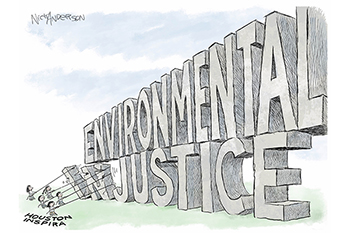Concrete Batch Plants
Bill Sponsors / Authors:
![]() Rep. Keith Bell
Rep. Keith Bell
R - Athens
![]() Sen.
Charles Schwertner
Sen.
Charles Schwertner
R - Georgetown
Supporting Documents / Links:
- Dr. Loren Hopkins testimony on HB 1505
March 28, 2023 - Restriction on concrete batch plants stall in Texas Legislature, but modest reforms advance
Houston Chronicle - April 28, 2023 - Texas House moves to crack down on polluters with stricter penalties and heavier oversight
Texas Tribune - May 17, 2023 - TCEQ proposes new rules to concrete batch plant permits as EPA investigation, court challenges loom
Houston Chronicle - May 18, 2023 - State environmental agency proposes new rules for concrete plants in Texas
Texas Tribune - June 12, 2023
 Senate Bill 1397 – TCEQ Sunset Bill
Senate Bill 1397 – TCEQ Sunset Bill
During the 88th Legislative Session and the preceding months, there was an assertive, grassroots effort to raise awareness of the environmental impacts on communities, particularly air pollutants from industrial facilities.
One industry that attracted particular attention among communities statewide is concrete batch plants, which combine raw materials such as sand, water and cement to make concrete.
Several bills were introduced during the session including measures aimed at requiring the agency to focus enforcement and increase penalties on repeat violators, change permitting qualifications and notice requirements, increase public input and engagement, and add improvements to the decision-making process. While many of the bills did not receive a hearing, a few bills were discussed at length.
The Texas Commission on Environmental Quality (TCEQ) Sunset bill – Senate Bill 1397 – was a must pass piece of legislation that provides for the continuation and functions of the TCEQ. This was the primary focus for advocates to make changes in how concrete batch plant permits are granted. Those changes within SB 1397 include lower production limits, dust reduction, and setting minimum distance requirements from nearby communities.
- Annual production rate limits on individual plants was capped at 650,000 cubic yards per year.
- New proposed rules will also lower hourly concrete production rates for some counties, including Fort Bend, Galveston, Harris, Liberty and Montgomery, to 200 cubic yards per hour from the original 300. The current daily maximum of 6,000 cubic yards per day has been removed from the proposed permit.
- Concrete batch plant permits would require workers to reduce the dust produced at plants when transporting and transferring concrete.
- The agency proposes that companies be required to water, sweep and clean machinery, trucks and plant road entrances to minimize dust, in addition to the already required fences around the perimeter of the facility that are at least 12 feet tall.
- Increased minimum distance requirements for concrete batch plants from nearby communities from the 100 feet from any property line to 200 feet in Harris, Chambers, Fort Bend, Brazoria, Galveston, Montgomery and Waller Counties and 300 feet in Cameron and Hidalgo counties.
Permits for concrete batch plants aim to limit pollution in the form of particulate matter, crystalline silica, carbon monoxide and other air toxins that have been linked to respiratory diseases and cancer.
As Dr. Loren Hopkins wrote in her testimony on the bill,
“TCEQ’s responsibility is to protect human health and the environment in our state. Their work is essential to the well-being of Texans and especially important to the City of Houston where more toxic air pollutant emissions are produced than any other city in our nation. Moreover, the lack of zoning in the City increases the need for effective permit compliance to protect fence-line communities.”
The bill passed both chambers and was signed by the Governor.